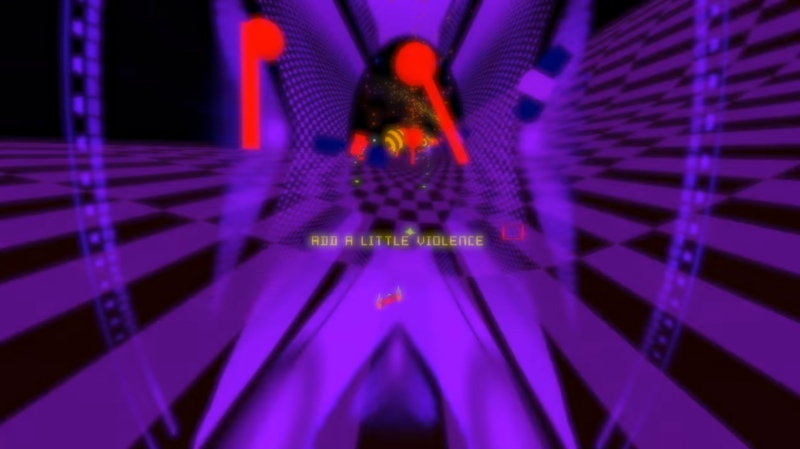
Industrial and synth-rock music fans got good news on Thursday when Nine Inch Nails announced its next EP, titled ADD VIOLENCE, coming in only eight days. What's more, fans got a hint of the EP with a catchy single—and to boot, its video includes an out-of-nowhere starring appearance from a video game. NIN went pretty indie here, choosing one of the weirdest video games of 2017.
The entire video for the song "LESS THAN" revolves around a woman playing a customized version of Polybius. No, it's not the urban-legend arcade game that stole souls in Oregon in the '80s; instead, it's the 2017 arcade-action game released by Jeff "Llamasoft" Minter (of Tempest 2000, TxK, and Space Giraffe fame). Minter confirmed to Ars Technica that the project began with a cold call from NIN's Trent Reznor via Twitter direct message.
"[Trent] mentioned that he'd enjoyed Llamasoft's stuff and he had an idea to discuss," Minter says. "Of course I was super chuffed to hear he'd liked our work, as I've enjoyed his a lot over the years too!"
The idea: Trent wanted to show off Polybius exactly as it looks and plays, only with song lyrics and other visual effects overlaid to the beat of NIN's latest single. However, the game is currently a PlayStation 4 exclusive, so in order to give Reznor what he needed to direct the gameplay in a video, Minter forwarded the musician something pretty exclusive: one of the only copies of the game's PC version, which still doesn't have a release date.
Minter says the customized code in Reznor's copy of the game is "simple stuff, really." It calls a script for every frame of the game as synced to the music, and its primary purpose is to display text at whatever timestamp its user desires. The script can also accept field-of-view and shader modifications, and the game itself had extra button inputs added so that a player could fine-tune some visual effects with nothing more than button taps. Minter was kind enough to send us some sample code:
>START_TRANSITION,4
# Track energy increases
>[1:07.5]FOV 4.0,2.0,0.5
>ROLL -0.5,0.3,12.0
>POSTPROC 3,3,0.1,0.05,ff7f00ff,ff00ffff
>TETHER 1.0,0.3,2.0
>THROTTLE 0.5,0.7,1.0
>[1:08.80]PRINT"SO WHAT ARE YOU WAITING FOR?",1
Minter says he was under a time crunch with "only a few days" to finish the build, and he didn't see NIN's results until the video went live to the public. "Of course I was a bit anxious, since when you're doing your own creative work and it needs to mesh with the work of an artist, it's not entirely a given that your work will agree with what he had in mind," Minter says. "I just did stuff that I felt went well with the energy of the music, and I was really pleased when Trent liked what we'd done." (Minter is clearly excited, adding, "Did we mention we're chuffed?")
Reznor has long championed video games in the pop culture spectrum, whether by composing soundtrack tunes for Quake 1 and Call of Duty: Black Ops or by talking at length about the innovation and experimentation he's loved in burgeoning platforms.
Polybius is largely similar to Minter's other vector-graphics arcade-action classics, and while it's a delight to play on both flat screens and PlayStation VR, Minter tells Ars that he hopes to have the PC version ready to ship when his six-month PlayStation exclusivity deal expires in November. Minter confirms that he already has it running on Oculus Rift hardware, and he's working to add HTC Vive and Windows Holographic support as well.Listing image by Llamasoft/Nine Inch Nails
reader comments
49